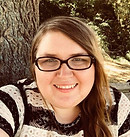A Person's a Person...
- SA McClure
- May 24, 2016
- 3 min read

One of the greatest things I learned in my master's program was that giving false hope to people-promising things we don't know to be true-can cause more harm than good. I believe this. I believe that when we tell our friends, family, and our students that "everything will be ok" or that "everything will work out" when we don't actually know that for sure, we can cause more harm if things TO NOT turn out to be ok.
One the flip side, we shouldn't take away hope. We shouldn't tell a student or a person that they CAN'T achieve something, that they CAN'T try something new or that they CAN't become the person they want to be. During a conference I attended this week on academic and career advising, the keynote speaker, Terrell Strayhorn, discussed how our expectations of people can have a significant (and negative) impact on others.

Our expectations of others impacts their view of themselves.
Think about that.
Out of all the people we interact with, our underlying belief systems about people can come through. Our perceived notions of who they should be based on their gender, ethnicity & race, sexual orientation, and class-among others-can impact how we relate to them. In an advising setting, how we understand others can impact the advise that we give.
And, by allowing our preconceived notions to overrule our ability to positively advise others, we are doing harm.
For example:
I recently had a student who was having a rough semester. She was a first-year, first-generation student who was struggling to pay for college. She had also faced adversity during the course of the semester: one of her friends passed away. Although she had achieved academically during the fall semester and was engaged on-campus in a multitude of ways, she was struggling to concentrate and keep her grades up. She wants to be a doctor.
She will be a great doctor.
But, her grades that semester weren't on par with what will be expected come admissions time. During her academic advising meeting, this student was told that she should consider switching majors. Or that the road ahead to bring her GPA back up may be too challenging for her. Essentially, that she wasn't cut out to be a doctor.
How would those statements make you feel if you were that student?
I know how I would feel. I would feel like I might not be able to do it.
This is not what I believe advisors should do. I believe that we should be realistic with our students (and others) about the amount of work it's going to take to accomplish our goals; however, I also believe that if a student is putting in the effort to achieve but is facing adversity that we should help them strategize about how to overcome the struggle.

We talked about the grade replacement policy, which, by the way, was the first time she had heard about it. We talked about the potential of taking summer classes to pump her GPA up. We talked about ways to explain away the W she took in a class through her personal statements. We talked about going to counseling services so that she could process through the struggles she was facing.
Because she can do it.
I don't view this as giving false hope. I view this as a realistic approach to helping students set expectations for themselves. Not the other way around.
This extends past my work in advising. And I think it should. We need to figure out ways of acknowledging the preconceived notions-the expectations-we have others based on difference and readjust how we interact with people. Especially if we work in a field where our words and actions can have an impact on others' self-perception.
In closing...

.

































Comments